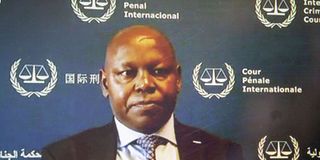Confirmation of ICC charges against Paul Gicheru to proceed as planned

Kenyan lawyer Paul Gicheru makes his first appearance before the ICC on November 6, 2020, before Judge Reine Adélaïde Sophie Alapini-Gansou of Pre-Trial Chamber A.
What you need to know:
- The judgement, which is a major win for prosecutor Fatou Bensouda, makes Mr Gicheru's case the first to be handled by a single-judge chamber, instead of a three-judge team.
The confirmation of charges against Kenyan lawyer Paul Gicheru at the International Criminal Court (ICC) will proceed as scheduled after the Appeals Chamber rejected attempts to have the process started a fresh.
The five-judge Appeals Chamber, in a majority decision, has declared that Pre-Trial Chamber A, though composed of one judge, is properly constituted to handle Mr Gicheru’s case.
In a ruling dated March 8, 2021, the judges declared that the ongoing process does not restrict any of Mr Gicheru’s fundamental rights.
They dismissed an appeal lodged by the Office of Public Counsel for the Defence (OPCD), seeking a fresh process of confirming the six charges. The OPCD wanted the case to be handled by a three-judge chamber.
The judgement, which is a major win for prosecutor Fatou Bensouda, makes Mr Gicheru's case the first to be handled by a single-judge chamber, instead of a three-judge team.
Gicheru's arguments
The case involves obstruction of the administration of justice by corruptly influencing witnesses of the court.
In its appeal, the OPCD had argued that the Pre-Trial Chamber composed of Judge Alapini-Gansou only is incompetent and has no legal basis.
The argument was on the basis that a provisional rule (Provisional Rule 165) of the Rome Statute, that allows formation of a single-judge chamber, is yet to be formally adopted, rejected or amended by the Assembly of State Parties (ASP).
While supporting the OPCD’s submission that the provisional rule is incompatible with the Statute, Mr Gicheru said his right to equality had been infringed as he was treated differently from others in similar cases.
Mr Gicheru contended that the statutory right to a chamber composed of three judges reduces the risk of errors made by a single judge, as judges bring subjective biases about the parties as well as the procedures to be used based on legal, cultural and other experiences.
Urgent cases
The OPCD, which was representing Kenyan lawyer Phillip Kipkoech Bett, who is being sought for interfering with the court's witnesses, told the court that the provisional rule could not be applicable in Mr Gicheru's case.
But the Appeals Chamber presided over by judge Howard Morrison said the single-judge chamber handling Mr Gicheru’s case is legal, based on the provisional rule which was adopted by the ICC Judges acting in plenary in February 2016.
The chamber added that article 51 of the Statute allows the provisional adoption of rules in urgent cases in order to address specific situations that are not already provided for in the rules.
“A failure on the part of the Assembly of States Parties to decide on the provisional rule adopted in these circumstances does not negate the urgency or address the need for the rule so adopted,” said judges Howard Morrison, Piotr Hofmański and Luz del Carmen Ibáñez Carranza.
They held that the Pre-Trial Chamber did not err in finding that the provisional rule is not incompatible with the Statute and that it should be considered applicable until the ASP adopts, amends, or rejects it.
Judges Chile Eboe-Osuji and Solomy Balungi Bossa dissented in the ruling.





